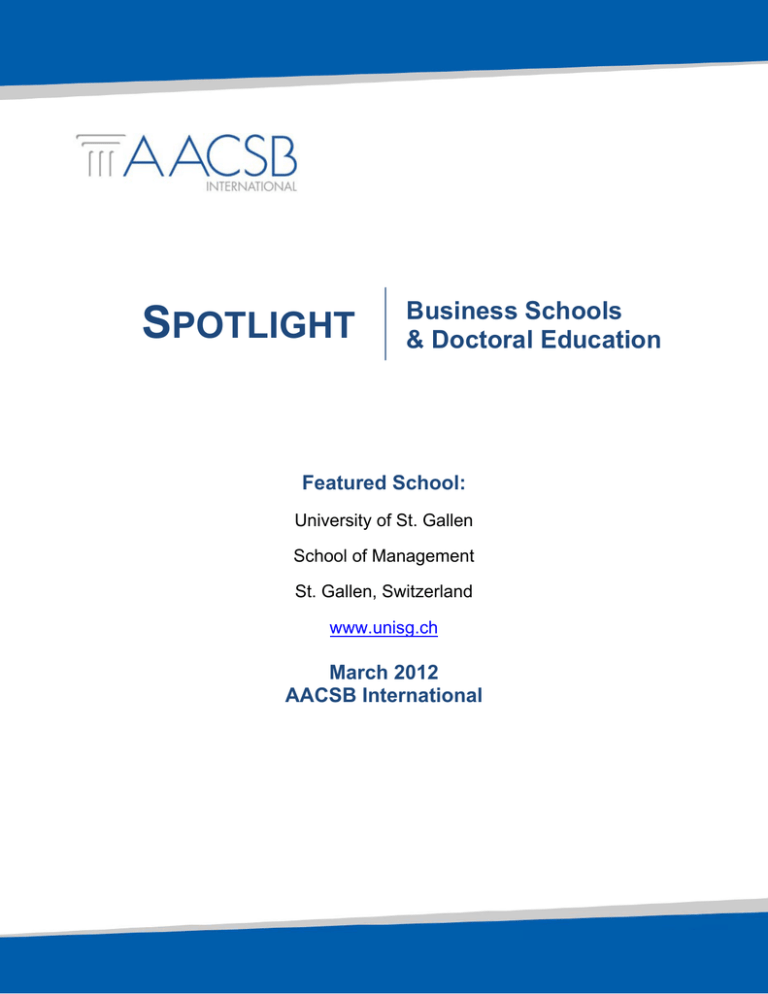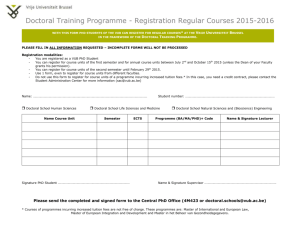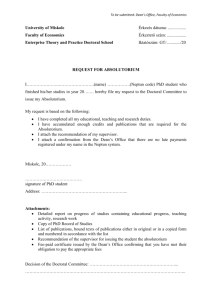
SPOTLIGHT
Business Schools
& Doctoral Education
Featured School:
University of St. Gallen
School of Management
St. Gallen, Switzerland
www.unisg.ch
March 2012
AACSB International
SPOTLIGHT | Business Schools & Doctoral Education
University of St. Gallen | 2
University of St. Gallen School of Management, PhD Program in
Management
Finding a climate for change in the 2004–2007 timeframe as the Bologna process was implemented and
university-wide reforms were underway, the University of St. Gallen (HSG) instituted several revisions to
its PhD Program in Management (PMA). For influence, HSG observed some of the doctoral programs
delivered at some of its fellow CEMS Alliance schools, and took into strong consideration the post
Bologna political discussions at the Swiss and the European levels. Today’s format, unique among many
other doctoral programs, offers students a standard, part-time track and an expanded, full-time track
based on their career aspirations. The PMA is currently the University’s largest doctoral program, with six
specializations (down from 12 following the 2007 reforms).
As Professor Winter, Academic Director of the PhD Program in Management, and Dr. Felix Wortmann,
Executive Director of the PhD Program in Management, explain, a PhD is regarded as a top qualification
in all German-speaking countries, and a post-doctorate degree called the “habilitation” is required in order
for doctorate-holders to teach at most universities in these countries. With such high standards in these
countries it is little wonder that the doctoral program at St. Gallen’s School of Management, as well as its
admission process, is quite rigorous in its aim to provide students with the necessary supervision and
opportunities to enhance their research skills.
Two Tracks
Students choose from six specializations for their doctoral study: accounting, business innovation,
finance, international business, strategy and management, and marketing.1 With the 2007 reforms, four of
the programs were established to be delivered in English (accounting, finance, international business,
and strategy and management); however, the remaining two programs delivered in German provide the
option of an English-language component. Presently, the business innovation specialization is the largest
with roughly 24% of all PMA students, and finance is the smallest with roughly 10% of PMA students. Dr.
Winters notes that the average distribution of students for each specialization is close to 13%-14%.
As mentioned earlier, the PMA offers students not only a standard track oriented to individuals that work
at the University or a company during their doctoral studies, but also an expanded study program for fulltime students who plan for an academic career.2 Of the six specializations, only accounting does not have
an expanded track. Both tracks have a “coursework stage” and a “research stage” followed by the
dissertation.
© AACSB International. All Rights Reserved.
SPOTLIGHT | Business Schools & Doctoral Education
University of St. Gallen | 3
In the standard track, students attend five courses in the first phase of the program. Some of the courses
are compulsory, while most are electives, followed by two thesis-related seminars in the second phase of
the program. Full-time students, on the other hand, must complete 9 courses in the first phase, followed
by the same “research stage” requirements as those for the standard track students.
Students within both tracks are offered the same courses and electives within their specialization;
however, some of the compulsory courses for full-time students are offered as electives to standard track
students. For example, within the international business specialization curriculum, all students are
required to take International Corporate Governance and Research Methods. However, while full-time
students are also required to complete Philosophy of Science and International Entre- and
Intrapreneruship, these two courses are offered as optional electives to standard track students.3 Both
groups of students have the same elective offerings available to them, with the difference that scientific
track students must complete five electives during their studies, and standard track students must
complete three. Upon completion of the course requirement, and after having handed in the research
proposal, both groups of students must then complete two thesis-related seminars, which for international
business doctoral students are the Doctoral Colloquium in International Business I and Doctoral
Colloquium in International Business II. In comparison to the track for full-time students, the standard
track has a much lower workload. Thesis requirements are similar for both types of students.
On average, doctoral studies take four years for students to complete. If students wish to obtain a
‘habilitation’ after their PhD studies or obtain similar qualifications that make them eligible as University
teachers, another 4-6 years of study and research are necessary. Therefore the PhD phase is only part of
the qualification for an individual to become a professor, and must be taken into consideration when
looking at the doctoral structure for those who intend to pursue an academic career. At some Universities,
the habilitation phase is combined with an employment as ‘junior professor’ (Germany) or with a (tenure
track or non-tenure track) assistant professorship.
At close to 370 students overall in the PhD program in Management, the vast majority of doctoral
students pursue the standard track, compared to roughly ten students in the full-time track. As mentioned
earlier, a PhD is considered a top qualification in German-speaking countries, and therefore a majority of
the PhD candidates enter industry positions upon completion of their doctoral studies. The large number
of PhD candidates at St. Gallen is largely due to the cultural view that a doctorate is not exclusive to only
those pursuing an academic career, but for those who need this third phase of university education to
work in highly qualified and highly skilled jobs at companies.
© AACSB International. All Rights Reserved.
SPOTLIGHT | Business Schools & Doctoral Education
University of St. Gallen | 4
Admission to PMA
Unlike some business doctoral programs in different parts of the world, at St. Gallen PhD candidates
must hold a bachelor’s and master’s degree from the same field of study in management. The view
behind this is that in order to award a student with a PhD in business, the school must ensure that
students enter the program with an appropriate level of business acumen. Students without this
qualification may be allowed to attend master’s level courses and take examinations in these courses to
show a minimum level of business knowledge. For students who hold an MBA degree, the type of MBA is
assessed prior to acceptance into the PhD program, to see if it fits with the objectives of the doctoral
program. In its applicant review process, HSG distinguishes between executive and regular MBAs, as
well as between part time and full time programs. Applicants who have earned part time or executive
MBA degrees are not eligible to be admitted since HSG does not consider this type of education to fulfill
the requirements for potential candidates. HSG looks for candidates whose prior education shows
exclusive academic focus, rather than a balance between work and study.
Furthermore, the admitting committee must take into consideration (particularly for European students)
what type of institution awarded a candidate’s masters degree since not all higher education institutions
are the same, explains Winter. For example, institutions called “Universities of Applied Sciences” (unique
to German-speaking countries) may offer master’s programs, although they typically do not conduct
extensive academic research and therefore the degrees they offer are often not deemed sufficient
preparation according to the admissions criteria set by HSG.
The Dissertation Phase
While the first stage of study for PMA students is characterized by parallel cousework and thesis proposal
preparation, the second stage requires that students participate in two thesis-related seminars while
working on their thesis. Prior to submitting their thesis proposal, students are coupled with a supervisor
who is a professor at the University. Supervising doctoral students is considered part of the duties of a
professor, adds Winter, and does not lead to additional compensation for the extra time faculty members
put forth to working with students. It is preferable that the student-supervisor teams conduct research that
aligns with both individuals’ research interests. Although the maximum number of students that a
professor can supervise is 15, the average remains 7 students per supervisor.
Students have the option of presenting their thesis in two forms: through a more traditional, self-contained
book referred to as a “monograph” or through a collection of several essays, known as a “cumulative
thesis.”4 The cumulative format consists of a minimum of three papers, however most students choose to
write more papers. It also requires an “umbrella paper” that integrates each of the papers and explains
© AACSB International. All Rights Reserved.
SPOTLIGHT | Business Schools & Doctoral Education
University of St. Gallen | 5
how the set contributes to a common research question. Preferences among students for the cumulative
or traditional approach are split equally, however students in more international disciplines consisting of
many conferences and seminars tend to favor the cumulative approach, adds Winter. A joint format
where several authors contribute to the thesis is also available, especially in cases of particularly
extensive projects; however, this approach is rarely taken. According to Dr. Winter, this option is not very
favorable since it makes it more difficult for the dissertation committee to evaluate each joint author’s
contribution to the project and award an accurate grade to each individual on the team.
Once completed, the student’s thesis is defended to the thesis committee who evaluates and awards the
student his/her grade. The thesis committee comprises two professors, one of which must be a full
professor from St. Gallen. The other may be an assistant professor or a professor from another university.
One serves as the student’s primary supervisor, while the other committee member is responsible for
ensuring that the defense is carried out in a formal and fair manner.
Funding and Other Aspects of the Program
The PhD Program in Management is a fee-based program. The majority of students (70%- 80%) fund
their studies through employment at the University as research associates and roughly 20% are either
employed by companies or supported by public research funding, explains Dr. Wortmann. Each semester
requires that students pay a fee, and students must also pay a fee for their final examination.
Besides providing assistantships as a way to help students fund their studies and enhance their research
skills, HSG also provides other opportunities for augmenting students’ academic experiences. The PhD
Exchange Program aims to attract and motivate exceptionally talented PhD students to participate in an
exchange at one of St.Gallen’s partner universities. The program targets students already in their thesis
stage. The aim of the experience is to help inspire new ideas during the thesis stage, whether it is through
working with and meeting international students and academics, gathering empirical data, or simply by
being in a new cultural environment.5 Students may also choose to attend some of their courses abroad,
and Wortmann estimates that roughly 25% of students choose to do so. Acknowledgements: AACSB International is grateful for the assistance of Dr. Robert Winter, Academic
Director of the PhD Program in Management, and Dr. Felix Wortmann, Executive Director of the PhD
Program in Management.
© AACSB International. All Rights Reserved.
SPOTLIGHT | Business Schools & Doctoral Education
University of St. Gallen | 6
End Notes 1
University of St. Gallen (2012). Business Administration (PMA) webpage. Electronic document, http://www.unisg.ch/Studium/Doktorat/BetriebswirtschaftlichesProgramm.aspx, accessed January 16, 2012. 2
University of St. Gallen (2012). PhD Programmes Brochure, 12. Electronic document, http://www.unisg.ch/~/media/Internet/Content/Dateien/Studium/Broschueren/HSG_DoctoralStudies.ashx?fl=en, accessed January 16, 2012. 3
University of St. Gallen (2012). International Business Curriculum webpage. Electronic document, http://www.unisg.ch/Studium/Doktorat/BetriebswirtschaftlichesProgramm/SchwerpunktInternationalBusiness/Cu
rriculum.aspx, accessed February 29, 2012 4
University of St. Gallen (2012). Types of Doctoral Theses at the HSG webpage. Electronic document, http://www.unisg.ch/Studium/Doktorat/AllgemeineInformationen/Dissertationsformen.aspx, accessed February 13, 2012. 5
University of St. Gallen (2012). PhD Programmes Brochure, 25. Electronic document, http://www.unisg.ch/~/media/Internet/Content/Dateien/Studium/Broschueren/HSG_DoctoralStudies.ashx?fl=en, accessed February 17, 2012. © AACSB International. All Rights Reserved.




